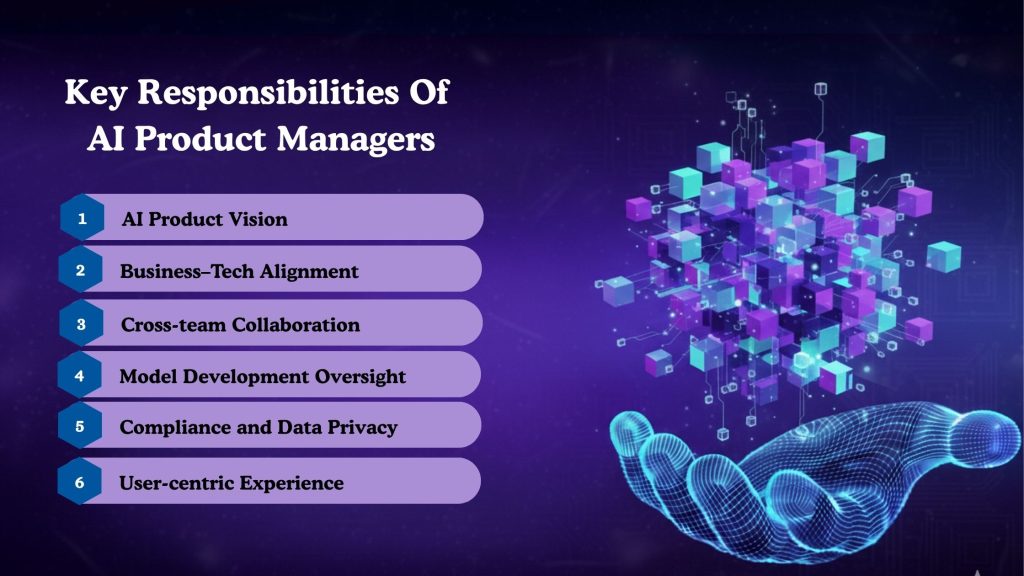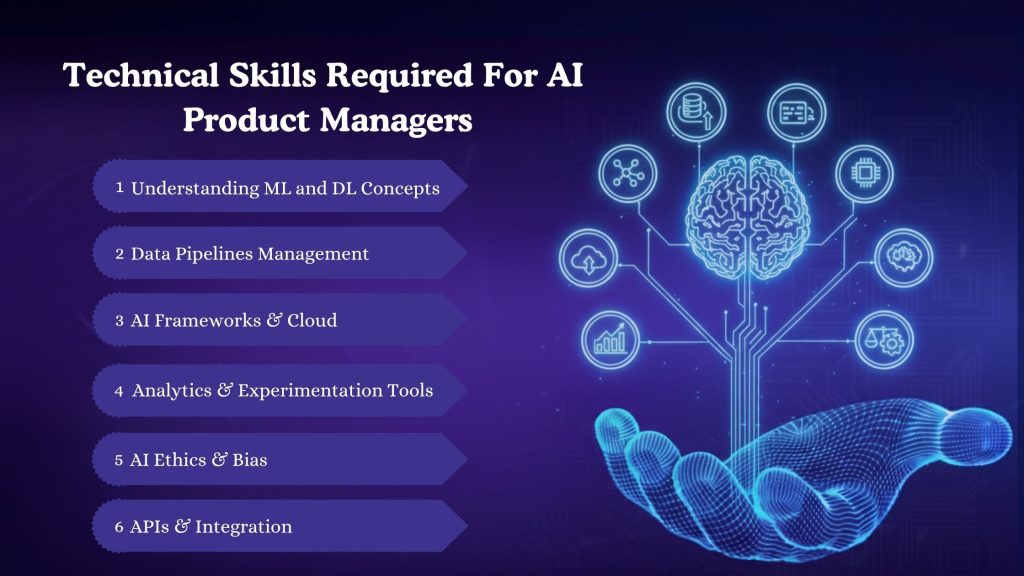
Hire Artificial Intelligence Product Managers: A Complete Guide to Building Smarter Teams

Blog Summary:
In today’s data-driven world, businesses are increasingly turning to Artificial Intelligence (AI) to improve efficiency, innovate faster, and enhance customer experiences. However, successfully integrating AI into products requires the right leadership. Hiring Artificial Intelligence Product Managers brings together technical expertise and strategic thinking to transform ideas into scalable AI-driven solutions. This blog explores why and how businesses should hire the right AI product managers, their responsibilities, required skills, and more.
As AI continues to reshape industries, organizations need professionals who can convert complex technologies into practical, result-driven products. That’s where the decision to Hire Artificial Intelligence Product Managers truly matters. These experts connect data science, engineering, and business strategy to create impactful solutions.
This blog will explore their roles, skills, benefits, and how hiring the right AI product manager can accelerate your company’s innovation journey and long-term growth.
Why Hire Artificial Intelligence Product Managers For Your Business?
Businesses today are no longer just experimenting with AI — they’re embedding it into every aspect of operations, products, and customer experiences. However, the success of these initiatives depends on having the right professionals who can bridge technical complexity with business intent.
When you hire Managers, you empower your organization with leaders who can align AI capabilities with your company’s strategic goals.
AI-Product Strategy Alignment
A successful AI product isn’t built on algorithms alone — it’s built on a clear understanding of how those algorithms serve the business strategy. Artificial Intelligence Product Managers ensure that every AI initiative supports the company’s vision, market objectives, and user needs.
They translate abstract ideas into achievable product roadmaps, prioritizing outcomes that create measurable business impact. This alignment helps prevent wasted efforts on technologies that don’t contribute to long-term goals.
Data-driven Product Solutions
In AI-driven environments, decisions are most effective when grounded in data. AI Product Managers lead with insights drawn from data analysis, user behavior, and performance metrics. Their expertise ensures that real evidence rather than assumptions back every product iteration.
By promoting a data-first mindset, these managers optimize efficiency, improve model accuracy, and ensure solutions continuously evolve with user demands and market trends.
Ethical AI Implementation
As AI technologies advance, the need for ethical responsibility grows stronger. Artificial Intelligence Product Managers play a crucial role in ensuring fairness, transparency, and accountability within AI systems.
They set guidelines for responsible data usage, monitor for bias, and maintain compliance with privacy regulations. By embedding ethics into every stage of development, they help businesses maintain user trust and safeguard brand reputation while staying ahead of regulatory challenges.
Key Responsibilities Of Artificial Intelligence Product Managers

The role of an AI Product Manager goes beyond conventional product leadership. These professionals combine deep technical awareness with a strong business mindset to ensure that every AI initiative delivers value.
When you hire AI Product Managers, you invest in experts who can turn innovative ideas into scalable and responsible AI solutions that align with your organizational goals.
AI Product Vision
AI Product Managers are responsible for defining a clear and achievable product vision. They analyze emerging trends, customer needs, and technological possibilities to shape a forward-thinking AI roadmap.
Their goal is to ensure every feature or model developed supports business outcomes and user expectations, paving the way for products that are both innovative and relevant.
Business–Tech Alignment
Balancing technical potential with business goals is one of the most vital responsibilities of AI Product Managers. They act as the link between data scientists, engineers, and leadership teams, ensuring that AI models are developed in an integrated business strategy rather than in isolation.
This alignment drives consistent progress toward measurable success rather than just technical experimentation.
Cross-team Collaboration
AI projects demand collaboration across multiple disciplines — from data science and engineering to marketing and customer success. AI Product Managers coordinate these teams, facilitating smooth communication and eliminating silos.
Their ability to translate technical concepts into business language (and vice versa) ensures every team works toward a shared vision efficiently.
Model Development Oversight
Model creation is at the core of AI product management. AI Product Managers oversee the end-to-end process — from data selection and model training to validation and deployment.
They ensure each stage meets quality benchmarks, ethical guidelines, and operational goals. By maintaining close oversight, they guarantee that AI models not only function well technically but also serve real user and business needs.
Compliance and Data Privacy
Data privacy and security are no longer negotiable in AI-driven businesses. AI Product Managers make sure every system complies with global data protection standards and organizational policies.
They implement measures to handle user data responsibly and ensure that compliance isn’t just a checklist but an integral part of product design.
User-centric Experience
While technology drives AI products, the end goal always revolves around the user. AI Product Managers emphasize human-centered design principles, ensuring products remain intuitive, fair, and valuable to users.
They use feedback loops and analytics to continuously refine the user experience, building trust and long-term engagement with every release.
Levels Of Artificial Intelligence Product Managers
AI product management roles vary based on experience, expertise, and strategic involvement. When businesses hire product managers, understanding these levels helps them select professionals who best fit their current AI maturity and project complexity.
Each level plays a distinct role in shaping and scaling AI initiatives effectively.
Junior AI Product Managers
Junior AI Product Managers typically support larger product teams by handling foundational tasks such as gathering requirements, analyzing datasets, and assisting with project documentation.
They work closely under senior managers or technical leads to understand AI workflows, product lifecycles, and business objectives. Their primary focus lies in learning the intricacies of product management AI and contributing to smaller, well-defined deliverables.
Mid-level Product Managers
Mid-level AI Product Managers bridge strategy and execution. With a few years of experience, they take ownership of specific product modules or AI-driven features. They collaborate with data scientists and developers to ensure smooth implementation, conduct user testing, and monitor performance metrics.
Their balanced understanding of technology and business enables them to manage teams more independently while maintaining alignment with organizational goals.
Senior Artificial Intelligence Product Managers
Senior AI Product Managers oversee complex AI ecosystems and lead multiple teams across development, design, and data science. They focus on high-level strategy, product-market fit, and innovation planning.
Senior managers are responsible for defining long-term AI visions, setting ethical frameworks, and driving measurable business impact. Their leadership ensures that every AI initiative scales efficiently while maintaining transparency, performance, and compliance.
Core Technical Skills Required For AI Product Managers

Technical expertise is at the foundation of effective AI product leadership. When companies hire managers, they look for individuals who not only understand business strategy but also possess the technical proficiency to collaborate with engineers and data scientists.
These skills enable them to make informed decisions and deliver scalable, reliable AI solutions.
Understanding ML and DL Concepts
An AI Product Manager must grasp how Machine Learning (ML) and Deep Learning (DL) models function. This includes understanding algorithms, model training, data labeling, and performance evaluation.
Such knowledge allows them to communicate effectively with technical teams, evaluate trade-offs, and ensure that models align with the intended business objectives.
Data Pipelines Management
Data is the foundation of every AI product. Skilled product managers understand how data flows through systems — from collection and cleaning to transformation and analysis.
They collaborate with engineers to build efficient data pipelines, ensuring the data feeding into AI models remains accurate, relevant, and up to date.
You Might Also Like:
Data Science vs. Software Engineering: Key Differences Explained
AI Frameworks & Cloud
Modern AI products rely on frameworks and cloud platforms for scalability and performance. AI Product Managers should be familiar with tools such as TensorFlow, PyTorch, and Scikit-learn, as well as cloud environments such as AWS, Azure, and Google Cloud.
This knowledge helps them make technical decisions that optimize cost, speed, and resource allocation.
Analytics & Experimentation Tools
AI development involves continuous testing and iteration. Product managers use analytics platforms, A/B testing tools, and experimentation frameworks to assess model outcomes and product performance.
Familiarity with tools such as Google Analytics, Mixpanel, or Optimizely enables them to measure impact, interpret insights, and guide data-driven improvements.
AI Ethics & Bias
One of the most essential technical and strategic skills is understanding AI ethics. Product managers must recognize potential biases in datasets and models to ensure fairness and inclusivity.
They help establish ethical standards that promote transparency and accountability throughout the development cycle — a critical aspect for maintaining user trust.
APIs & Integration
Integration plays a significant role in AI product scalability. AI Product Managers oversee how APIs connect different systems, allowing AI models to interact with real-world applications.
Understanding APIs and integration methods helps ensure seamless interoperability across products, improving overall performance and user experience.
Different Hiring Models To Hire Artificial Intelligence Product Managers
Choosing the right hiring model is crucial when planning to hire AI product managers. The best option depends on your business goals, project complexity, and the scale of AI integration.
Each model offers unique advantages — from flexibility and cost-effectiveness to long-term strategic alignment.
Freelance Product Managers
Freelance AI Product Managers are ideal for startups and small businesses looking for short-term expertise or specific project support. They bring specialized knowledge in product management and AI and can quickly adapt to various development environments.
You Might Also Like:
AI in Product Development: A Comprehensive Guide to Innovation
This model provides cost efficiency and flexibility, allowing companies to access global talent without long-term commitments. However, maintaining consistency across teams may require stronger internal coordination.
In-house Product Managers
For organizations with ongoing AI initiatives or long-term product goals, hiring in-house AI Product Managers offers better stability and deeper product understanding. These professionals work closely with your teams to ensure that every AI feature aligns with your business strategy and user experience.
In-house managers also help establish company-specific workflows and foster collaboration between departments — a key factor in scaling AI solutions sustainably.
AI Product Agency Partnership
Partnering with an AI-focused product agency is often the best choice for companies aiming to accelerate AI adoption without building an internal team from scratch. Agencies provide access to a pool of experts, including product strategists, data scientists, and engineers.
By collaborating with a trusted technology partner like BigDataCentric, businesses can combine AI product managers and technical specialists under one roof to develop, test, and deploy solutions faster while maintaining quality and compliance.
What To Look For When Hiring Artificial Intelligence Product Managers?
Selecting the right AI Product Manager can define the success of your AI initiatives. When you hire someone, focus on candidates who combine strong technical knowledge, leadership qualities, and the ability to deliver value-driven results.
Beyond just managing workflows, these professionals shape the product’s strategic direction and ensure it aligns with market and business objectives.
AI Product Experience
Experience is one of the most critical factors in hiring. A capable AI Product Manager must have hands-on experience working with AI technologies, from concept creation to model deployment.
They should understand how data, algorithms, and user insights converge to form intelligent products. Real-world experience enables them to anticipate technical challenges and lead teams efficiently through complex development cycles.
Collaboration & Leadership
AI projects often involve cross-functional collaboration between engineers, data scientists, designers, and stakeholders. Strong leadership ensures clarity, accountability, and direction throughout the process.
Look for managers who excel at motivating teams, resolving conflicts, and maintaining consistent communication. Their leadership directly influences how effectively AI products evolve and deliver measurable outcomes.
Business & Technical Insight
The best AI Product Managers combine technical literacy with a solid grasp of business dynamics. They can translate business goals into actionable technical requirements, ensuring that every product decision drives ROI.
This balance allows them to collaborate with executives on vision while also engaging with developers and data teams on implementation.
Innovative Market Thinking
In a fast-moving AI landscape, innovation is key. Product managers must identify market gaps, anticipate user needs, and adopt emerging technologies to gain a competitive edge.
Their ability to think creatively and strategically ensures that your AI products not only solve current challenges but also evolve with future market shifts.
Benefits Of Hiring Artificial Intelligence Product Managers

When you hire product managers, you’re not just adding another role — you’re bringing in professionals who can elevate how your organization approaches AI innovation. Their blend of strategic insight, technical fluency, and leadership ensures that your AI initiatives move from concept to execution efficiently and ethically.
Here are some benefits –
Faster AI Development
AI Product Managers streamline workflows by connecting technical and business objectives. Their structured approach ensures faster product iterations without compromising quality.
By defining clear priorities and maintaining alignment across teams, they reduce development delays and help launch AI-powered products quickly — a crucial advantage in fast-evolving markets.
Cross-team Coordination
AI projects require seamless collaboration between departments. Product managers ensure effective coordination among data scientists, developers, marketers, and executives.
Their ability to align everyone toward a shared vision enhances efficiency, reduces misunderstandings, and keeps the product lifecycle on track from ideation to deployment.
Data-driven Decisions
AI Product Managers rely on data insights to shape product strategies and decisions. Their analytical mindset ensures that measurable results rather than assumptions guide features, models, and updates.
This approach improves product performance, enhances user satisfaction, and contributes to smarter business outcomes.
Innovative Competitive Edge
With a deep understanding of product management AI, these professionals continuously identify new opportunities for innovation. They evaluate trends, assess emerging technologies, and integrate them into your product roadmap.
This proactive mindset gives your organization a competitive advantage – helping you stay ahead of the curve in a market where innovation defines success.
Why Hire Artificial Intelligence Product Managers From BigDataCentric?
At BigDataCentric, we bring together technical excellence, industry knowledge, and strategic thinking to help businesses accelerate their AI journey. When you hire an artificial intelligence PM from our team, you get professionals who understand both the data science and business sides of AI development services.
Our product managers specialize in aligning AI-driven innovation with real-world business outcomes. They work closely with cross-functional teams to define strategies, manage development cycles, and ensure ethical AI implementation — helping you deploy intelligent solutions faster and more efficiently.
BigDataCentric’s experience extends across industries, from healthcare and finance to retail and manufacturing. We focus on building products that leverage AI capabilities and deliver measurable business value.
Whether you’re looking to expand your internal team or partner for end-to-end development, our AI product managers bring the expertise to make your AI vision a success.
Bring AI Expertise to Your Product Team
Hire Artificial Intelligence Product Managers who bridge technology and strategy to help your business innovate and scale smarter.
Conclusion
Demand for AI product managers is growing as businesses recognize the value of strategic AI leadership. These professionals serve as the driving force behind data-powered innovation, ensuring that every AI initiative delivers measurable results. Their mix of technical understanding, business acumen, and ethical awareness makes them indispensable in transforming AI potential into real-world success.
Whether your goal is to scale AI adoption, streamline operations, or enhance user experiences, investing in the right product management talent sets the foundation for sustainable growth.
Partnering with experienced professionals or trusted solution providers like BigDataCentric ensures your AI vision turns into a competitive advantage that shapes your company’s future.
FAQs
-
How much does it cost to hire Artificial Intelligence Product Managers?
The cost to hire AI Product Managers depends on factors like experience level, project scope, and location. Generally, the investment is moderate to high, reflecting their advanced skill set and strategic value.
-
How hiring Artificial Intelligence Product Managers improves ROI?
Hiring Artificial Intelligence PM improves ROI by ensuring AI solutions align with business goals, optimize operational efficiency, and deliver measurable, data-driven results that accelerate product growth.
-
How to choose the right AI Product Manager?
Choose an AI Product Manager with a balance of technical expertise, strategic vision, and leadership skills. Prioritize candidates experienced in machine learning projects and cross-functional collaboration.
-
What KPIs to track after you hire Product Managers?
Track KPIs such as AI model accuracy, product adoption rate, time-to-market, and ROI impact. These metrics help measure effectiveness and strategic alignment with organizational goals.
-
What industries most often hire AI Product Managers?
Industries like finance, healthcare, eCommerce, manufacturing, and logistics frequently hire Product Managers to enhance automation, personalization, and predictive analytics.

About Author
Jayanti Katariya is the CEO of BigDataCentric, a leading provider of AI, machine learning, data science, and business intelligence solutions. With 18+ years of industry experience, he has been at the forefront of helping businesses unlock growth through data-driven insights. Passionate about developing creative technology solutions from a young age, he pursued an engineering degree to further this interest. Under his leadership, BigDataCentric delivers tailored AI and analytics solutions to optimize business processes. His expertise drives innovation in data science, enabling organizations to make smarter, data-backed decisions.
Table of Contents
ToggleHere's what you will get after submitting your project details:
- A strict non-disclosure policy.
- Get in discuss with our experts.
- Get a free consultation.
- Turn your idea into an exceptional app.
- Suggestions on revenue models & planning.
- No obligation proposal.
- Action plan to start your project.
- We respond to you within 8 hours.
- Detailed articulate email updates within 24 hours.
Our Offices
USA
500 N Michigan Avenue, #600,Chicago IL 60611




